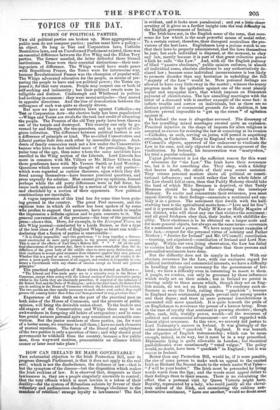TOPICS OF THE DAY.
FUSION OF POLITICAL PARTIES.
THE old political parties are broken up. Mere aggregations of public men do not compose parties : parties must have a policy— an object. So long as Test and Corporation laws, Catholic Restrictive laws, and an Unreformed Parliament existed, there was an esSential difference between the Fox Whim and the Eldon Tory parties. The former assailed, the latter defended those blessed institutions. These were their essential distinctions—their test- ing-points of difference. The Whigs would have made peace with Republican France, the Tories were for internecine war, because Revolutionized France was the champion of popular will. The Whigs advocated education for the people, as means of pre- paring the people to have and use political power; the Tories op-. posed it, for that very reason. People may suspect one or both of self-seeking and insincerity ; but their political creeds were in- telligible and distinct. Castlereagh and Whitbread in politics had nothing in common : they were moral antipodes—they moved in opposite directions. And the line of demarcation between the colleagues of each was quite as sharply drawn. But now we have no restrictive laws against Catholics—no Test or Corporation Acts--the elective body has been popularized —Whigs and Tories are rivals for the task and credit of educating the people. The Penates of the old Tory party have been thrown out of the temple and destroyed. This country can only be go- verned by and through the ten-pounders, and in a spirit of reli- gious toleration. The difference between political leaders is not a difference of principle or kind. The so-called Conservative and Liberal parties fade into each other by insensible degrees. Acci- dents of family connexion rank not a few under the Conservative banner who have in fact imbibed more of the prevailing, the po- pular tone of the awe, than some whom the same accidents have enrolled in the Whig section of the Liberals. Lord Lincoln has more in common with Mr. Villiers or Mr. Milner Gibson than those gentlemen have with Mr. Vernon Smith or Lord Worsley. Questions which were scarcely thought of by the old parties— which were regarded as curious theorems, upon which they dif- fered among themselves—have become practical questions, and press urgently for solution. Men cannot give up opinions, formed
i perhaps while the old party differences were n full force, be- cause such opinions are disliked by a section of their own friends and cherished by a section of their opponents. New political combinations are inevitable. -
A vague impression of this kind has for sometime been gain- ing ground in the country. The great Peel-measure and the captious tone in which its author has been spoken of by some who profess to support that measure' have done much to render the impression a definite opinion and to gain converts to it. The general conversation of the provinces—the tone of the provincial press—shows this. Here, for example, is the Liverpool Times' an able Whig journal—Conducted by a Leeds Baines, as fair a type of the best class of North of England Whigs as heart can wish— declaring that a fusion of parties is unavoidable- " It is totally impossible," says this gentleman "to keep together a Govern- ment constructed on mere party grounds, in the present state of the country. This is one of the effects of .Earl Grey's Reform Bill. * * * Of all the poli- tical phamomena of the present day, there is none more remarkable than the in- difference of the great body of the middle class to mere party distinctions, and their readiness to accept good measures from whatever quarter they may proceed. Whether this is a good or an evil, remains to be seen; but at all events, it de- prives a mere party Government of all support, and renders it impossible to con- struct a Government with any chance of success except on broad and general principles." The practical application of these views is stated as follows— "The Liberal and Free-trade party, are in a minority even in the House of Commons, except when acting with the Liberal section of the Conservative party; whilst in the Lords they are absolutely powerless, if deprived of the influence of Sir Robert Peel and the Duke of Wellington: and on the other hand, Sir Robert Peel can do nothing in the House of Commons without the Liberals and Free-traders. The two parties are thus equally necessary, to each other; and, united, they could govern the country better than zt has ever been governed at any previous time."
Experience of this truth on the part of the practical men on both sides of the House of Commons, and the pressure of public opinion, will bring the desirable union about. To the leaders and old-stagers of the Conservatives and Whigs there may be an awkwardness in foregoing old habits of antagonism ; and in some less genial natures junior spite may counteract reasonable con- viction. But the members of these parties, (as, for want of a better name, -we continue to call them,) have no such elements of mutual repulsion. The fusion of the liberal and enlightened of the two parties is only a question of time; and Why should good government be withheld from the country, because a few public men, from wayward motives' procrastinate an alliance which sooner or later must take place?


























 Previous page
Previous page